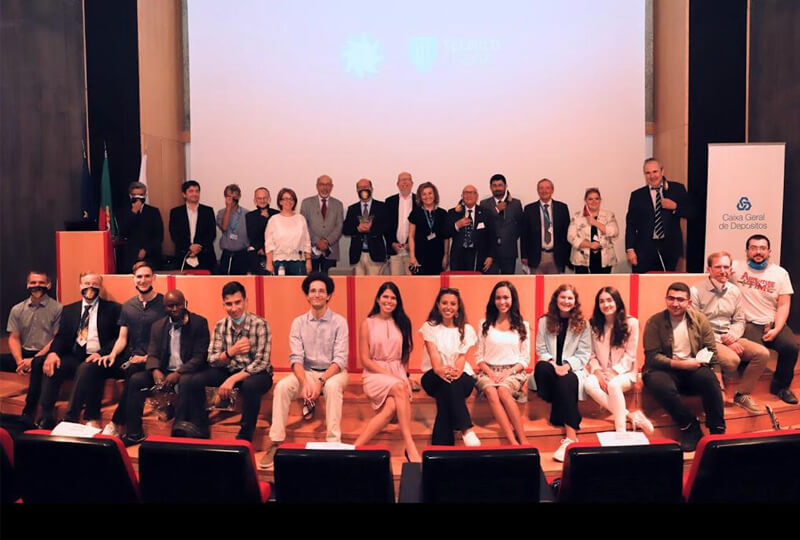Sponsored by The United Bank
22/09/2021

Sponsored by The United Bank
22 students, alumni and teaching assistants from Faculty of Architecture, Cairo University, won the second and third prizes and four appreciation prizes in the International Renewable Energy Competition in Portugal 2021
Cairo: September 22nd, 2021
Sponsored by The United Bank, 22 students, graduates and teaching assistants of Faculty of Architecture, Cairo University, won the second and third prize in the international competition “Home Kit” to design sustainable modular homes for slum dwellers in the time of the emerging epidemic of the Corona virus (Covid-19),
"HOME KIT – Design of Sustainable Modular House for Slum Dwellers amidst COVID-19". Within the activities of the World Council for Renewable Energy Conference, held at the Technical University of Lisbon in Portugal 2021, as well as winning 4 appreciation prizes in the competition, with the participation of 197 contestants from 20 countries in the world.
Heidi Taqi El Din Adel and May Loay El Hadidi won the second prize for the Blow up project. Yasmina Mohamed Ragab, Sherifa Khaled El Hagan, Mohamed Ahmed Shahwan, and Dina Ahmed Shaheen won the third prize for The Intertwined project. This is in addition to four awards of appreciation for high-level works: Team: Nada Yahya Zakaria, Mariam Mohamed Ibrahim, Suhaila Ismail Ali, Salma Adel Shoukri, Mariam Mohamed Ahmed, and Esra’a Ahmed El Kheder, and Team: Shahd Ahmed Dorgham, Abd El Rahman Mohamed Abd Allah, Mohamed Mamdouh Sobhi, Menna Khaled Kamal, Heidi Mohamed Mahmoud, Lamia Gamal Helmy and team: Amira Sameh Othman, and team: Sarah Samir Abou El Saoud, Ayat Allah Magdi and Rana Samir Abou El Saoud.
The World Renewable Energy Council competition comes within the activities of the 16th conference of the World Renewable Energy Council WREC 2021, which was held from 26-30 July 2021 at the Technical University of Lisbon in Portugal, in the presence of His Excellency the Portuguese Minister of Environment, the President of the University of Lisbon and experts in renewable energy and sustainable cities in Germany, The European Union and The United States, as well as members of the World Renewable Energy Council and speakers.
The organizing committee of the competition was formed from four parties: the University of Bath in England, the Technical University of Lisbon in Portugal, the University of Florence in Italy, and Cairo University, Egypt. The evaluation was also subjected to a lack of basic competition criteria based on the quality of thinking, creativity and innovation, namely: quality of design - architectural strategy and repeatability - sustainability of building materials - cost - bio-climate and energy performance - water and waste strategy, adapting to climate change and achieving sustainable development goals.
Ashraf El Kady, Chairman of The United Bank, congratulated the participating Egyptian delegation, students, graduates and teaching assistants of the Faculty of Architecture, Cairo University, and urged them to continue in the path of science, scientific research and creativity, as they are the leaders of Egypt's promising future.
Nevine Kashmiry - Deputy Managing Director for Business Sectors at The United Bank - says that The United Bank adopts a plan based on the expansion of support and support for the scientific research sector because of its paramount importance in building the future according to the foundations of knowledge, innovation, technology and development.
She added that The United Bank, for the third year in a row, supports distinguished Egyptian researchers to participate in international forums, based on the Egyptian state's vision for sustainable development 2030 and to raise the name of Egypt and its educational institutions internationally.
Kashmiry indicated that banks, locally and internationally, show great interest in scientific research because of its importance in sustainable development and in strengthening, rehabilitating and building the capacities of young Egyptian researchers in universities and research centers, which contributes to creating cadres with societal and environmental standards and values.
It is worth noting that the delegation of the Faculty of Engineering was under the auspices of Prof. Mohamed Othman El khosht, President of Cairo University, Prof. Abdel Rahman Nabawi Zekry - Vice President of Cairo University for Graduate Studies and Research, and Prof. Hossam El Din Abdel Fattah Ahmed, Dean of the Faculty of Engineering - Cairo University, with the support of Prof. Sherine Wahba, Vice Dean of the Faculty of Engineering for Education and Student Affairs - Cairo University, and Prof. Mohamed Mohsen El Attar, Vice Dean of the Faculty of Engineering for Graduate Studies and Research - Cairo University, as well as Prof. Ayman Hassan Mahmoud - President of the Board of the Architectural Engineering Department, Faculty of Engineering, under the supervision of Prof. Mohsen Mohamed Abou El Naga, Professor of Sustainable Environment and Smart Cities in the Department of Architecture - Faculty of Engineering, Cairo University, member of the competition’s organizing committee and member of the competition’s jury.
About the winning projects for the second and third prizes of the competition:
The second prize winning project - Blow Up: The project aims to design sustainable and green homes for residents of poor slums from recycled materials to face disasters resulting from climate change, such as storms, floods and droughts in light of the emerging epidemic of the Corona virus (Covid-19) due to the lack of basic services and facilities For living, housing instability and having to move on an ongoing basis.
The third prize winning project - The Intertwined: The project aims to transform the informal areas (slums) in Greater Cairo into safe and sustainable areas in which the citizen can live a dignified life in order to achieve the principle of social justice and improve the living and economic conditions of the residents of these areas in the neighborhoods of Greater Cairo by low methods Costs, renewable energy (solar), water and waste recycling, and achieving sustainable development goals.


